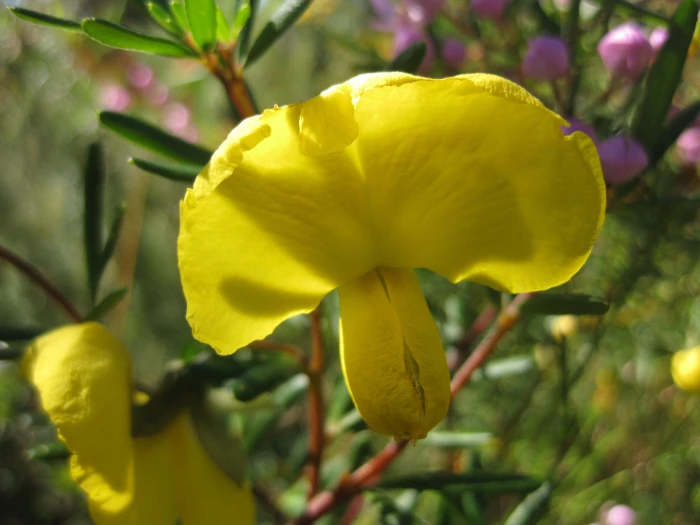Golden Glory Pea
(Gompholobium latifolium)
Golden Glory Pea (Gompholobium latifolium)
/
/

Andrew Thornhill
CC BY 4.0
Image By:
Andrew Thornhill
Recorded By:
Copyright:
CC BY 4.0
Copyright Notice:
Photo by: Andrew Thornhill | License Type: CC BY 4.0 | License URL: http://creativecommons.org/licenses/by/4.0/ | Rights Holder: Andrew Thornhill | Publisher: iNaturalist | Date Created: 2010-10-14T09:19:49-07:00 |
























Estimated Native Range
Climate Requirements
| • Precipitation | 8" - 80" |
| • High Temp. | 72°F - 100°F |
| • Low Temp. | 29°F - 60°F |
Summary
Gompholobium latifolium, commonly known as Golden Glory Pea or Broad-leaved Wedge-pea, is a deciduous small shrub native to dry sclerophyll forests and coastal heathlands in eastern Australia, specifically in Queensland, New South Wales, and Victoria. It typically grows up to 10 feet tall and has a spread of 3-5 feet. The plant features trifoliate leaves composed of three linear to lance-shaped leaflets and produces large, showy yellow pea-like flowers in spring and early summer. The flowers are arranged singly or in groups of up to three in leaf axils or on branch ends, attracting pollinators such as bees.
Golden Glory Pea is valued for its vibrant yellow flowers and ability to adapt to poor, sandy soils, making it suitable for coastal and native gardens, as well as for use in revegetation projects. It is drought-tolerant once established and requires well-drained soil and a position in full sun to part shade. While it is not commonly found in cultivation, it can be propagated from seed, which requires pre-treatment such as boiling or scarification to break dormancy. There are no major disease problems reported, but it may not tolerate heavy or clay soils.CC BY-SA 4.0
Golden Glory Pea is valued for its vibrant yellow flowers and ability to adapt to poor, sandy soils, making it suitable for coastal and native gardens, as well as for use in revegetation projects. It is drought-tolerant once established and requires well-drained soil and a position in full sun to part shade. While it is not commonly found in cultivation, it can be propagated from seed, which requires pre-treatment such as boiling or scarification to break dormancy. There are no major disease problems reported, but it may not tolerate heavy or clay soils.CC BY-SA 4.0
Plant Description
- Plant Type: Shrub
- Height: 1-3 feet
- Width: 1-2 feet
- Growth Rate: Moderate
- Flower Color: Yellow
- Flowering Season: Spring, Summer
- Leaf Retention: Evergreen
Growth Requirements
- Sun: Full Sun, Part Shade
- Water: Medium
- Drainage: Medium, Fast
Common Uses
Butterfly Garden, Low Maintenance
Natural Habitat
Dry sclerophyll forests and coastal heathlands in eastern Australia
Other Names
Common Names:
Scientific Names: Gompholobium latifolium, Gompholobium barbigerum, Gompholobium fimbriatum, Gompholobium fimbriatum, Gompholobium fimbriatum, Gompholobium psoraleaefolium, Gompholobium psoraleifolium
GBIF Accepted Name: Gompholobium latifolium